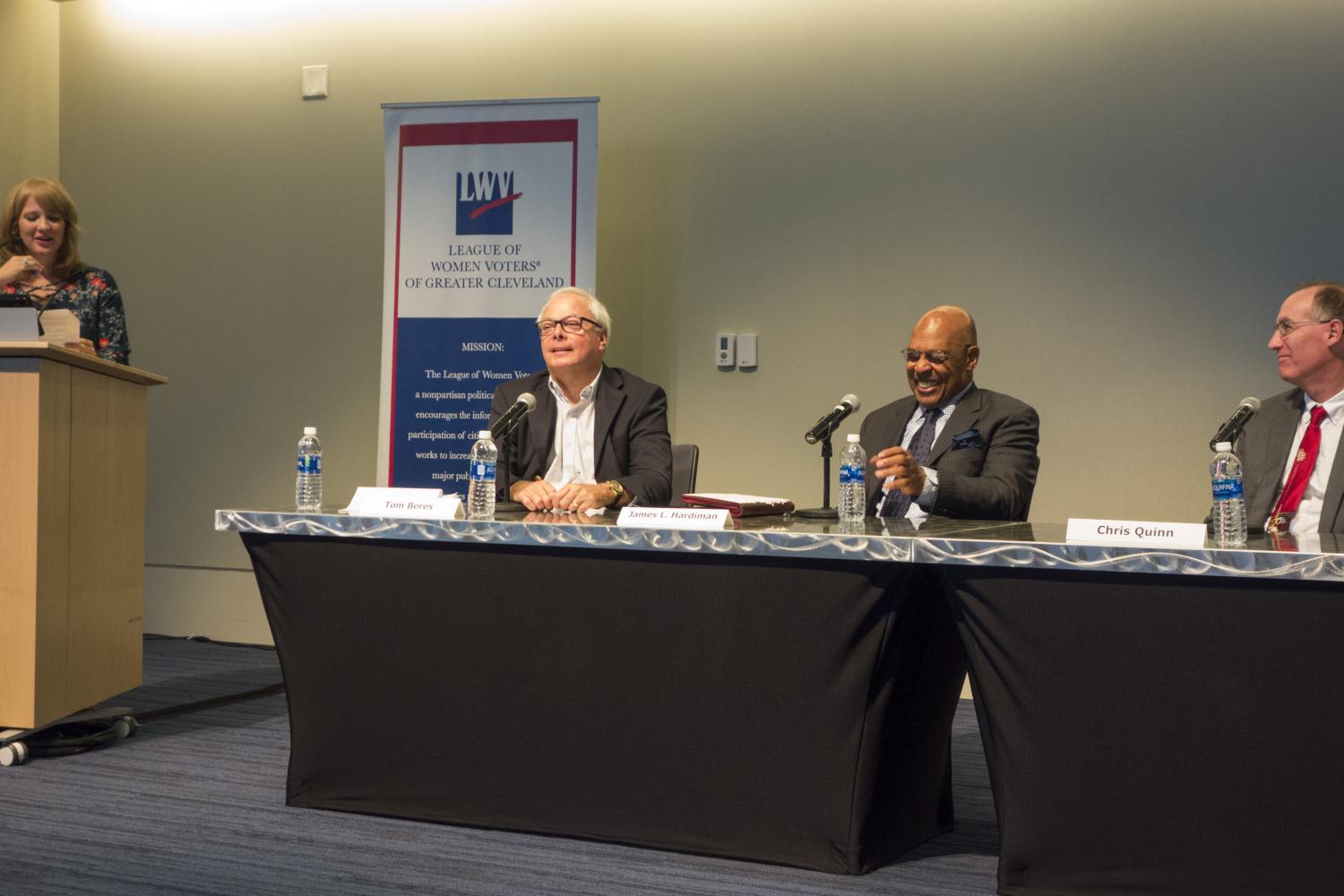Public policy forum discusses Cleveland’s challenges
Panelists visited CWRU to participate in a forum sponsored by the Siegal Learning Center. They discussed the future of Cleveland and the mayoral elections.
ssues in the Cleveland mayoral race made their way to campus this past week in a discussion by reporters and attorneys.
A public policy forum titled “The Election for Mayor: a discussion about the future of Cleveland” was held at Tinkham Veale University Center on Aug. 29.
The forum included a three-person panel that discussed Frank G. Jackson’s decision to run for an unprecedented fourth mayoral term for the city of Cleveland. Leila Atassi, a reporter for The Plain Dealer, moderated the event.
A major portion of the back and forth revolved around police misconduct, crime and the large level of lead paint in Cleveland. The panelists debated how to change controversial practices within the Cleveland Police Department.
Chris Quinn, the editor and president of Advance Ohio, criticized Jackson for “stand[ing] by the people he shouldn’t stand by.” He proceeded to say that the police department is seen by locals as an occupying force, as the majority of Cleveland officers are not from the city.
Tom Beres, a former reporter and acclaimed political correspondent for WKYC-TV, argued that police policy in Cleveland needs reform, saying that attempts to discipline officers are often reversed because the police contract is “too loose.”
While acknowledging the lack of experience of the other mayoral candidates, Quinn said that Jackson has “no concrete plans on how to deal with police misconduct.”
James Hardiman, Civil Rights Attorney and First Vice President of the NAACP Cleveland Chapter, believes that police and police unions have too much influence and the winner of the upcoming mayoral election needs to revise the police contract, but thinks that education and crime issues should be prioritized.
Beres argued that Jackson is too loyal to the people in his office. He does not believe that Jackson will discharge any current office members.
“The more you push Jackson, the less he wants to comply [with removing people from office positions],” he said.
Along the same lines, Quinn stated that it was astounding to him that Jackson has stood by Michael McGrath, Cleveland’s Director of Public Safety, after he refused to acknowledge police misconduct issues for which the city of Cleveland has had multiple lawsuits filed.
All three panelists generally agreed that Jackson has been making progress on reducing violent crime, but is moving too slowly. Hardiman said that the key to progress is developing more programs to generate summer jobs for youth. These jobs, he says, will keep them productive and therefore out of trouble.
Quinn argued that Jackson’s Community Benefits Program and education reform policy have made progress, citing improving numbers of increased attendance and reduced dropout rates in struggling Cleveland schools. Despite these points, Hardiman believes that since Jackson has mayoral control of all schools, he should be able to get a better handle on them.
The panelists also felt less than confident in Jackson’s ability to deal with Cleveland’s lead paint crisis. Beres asserted that he’s trying to use all the resources he has, but a previous lack of action incurred lawsuits costing the city more money and more problems.
He also brought up the ethical dilemma that if lead paint houses are to be removed, there needs to be an efficient and feasible way to relocate these low-income families. Hardiman thinks the solution is to invest money in housing inspectors as an attempt to alleviate future prosecution costs. He did not clarify where cuts in funding should be made to pay for these housing inspections.
While all panelists agreed that Cleveland is due for a mayoral change, they don’t believe there are any other viable options currently running for the office. To underline this, Beres said that Jackson does have a lot of positive qualities that the other candidates will find hard to beat; on top of having more than a decade of experience running a city.
“He is decent, trustworthy, has a good moral compass and voters find him likeable,” said Beres.
Quinn agreed with his sentiment and said, “The city has made a lot of progress during trying times. Jackson has been instrumental to many of these successes.”
Because of this, they concluded that Jackson will most likely be re-elected for a fourth term.
The forum was part of the Siegal Lifelong Learning programs, co-sponsored by Case Western Reserve University and the League of Women Voters-Cleveland. According to the Siegal Lifelong Learning website, “these [events] are held in various locations throughout the Greater Cleveland area and focus on current public policy issues facing Northeast Ohio.”


